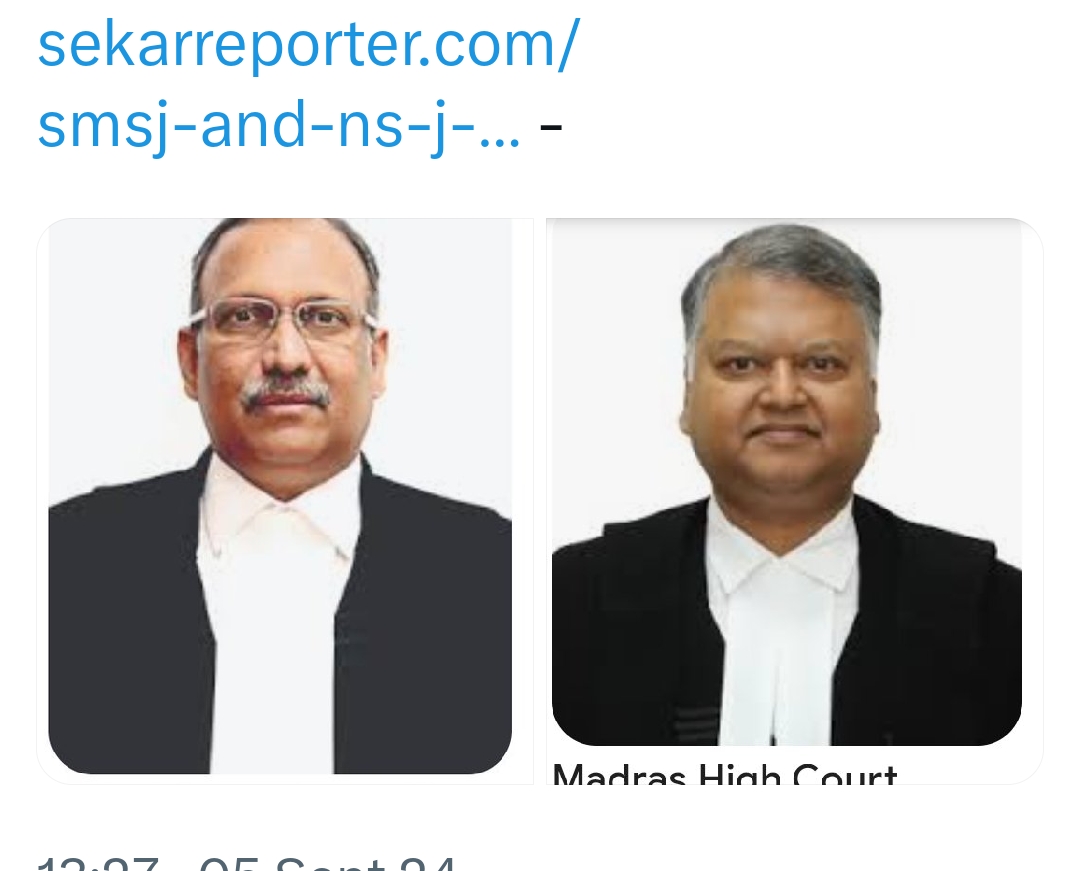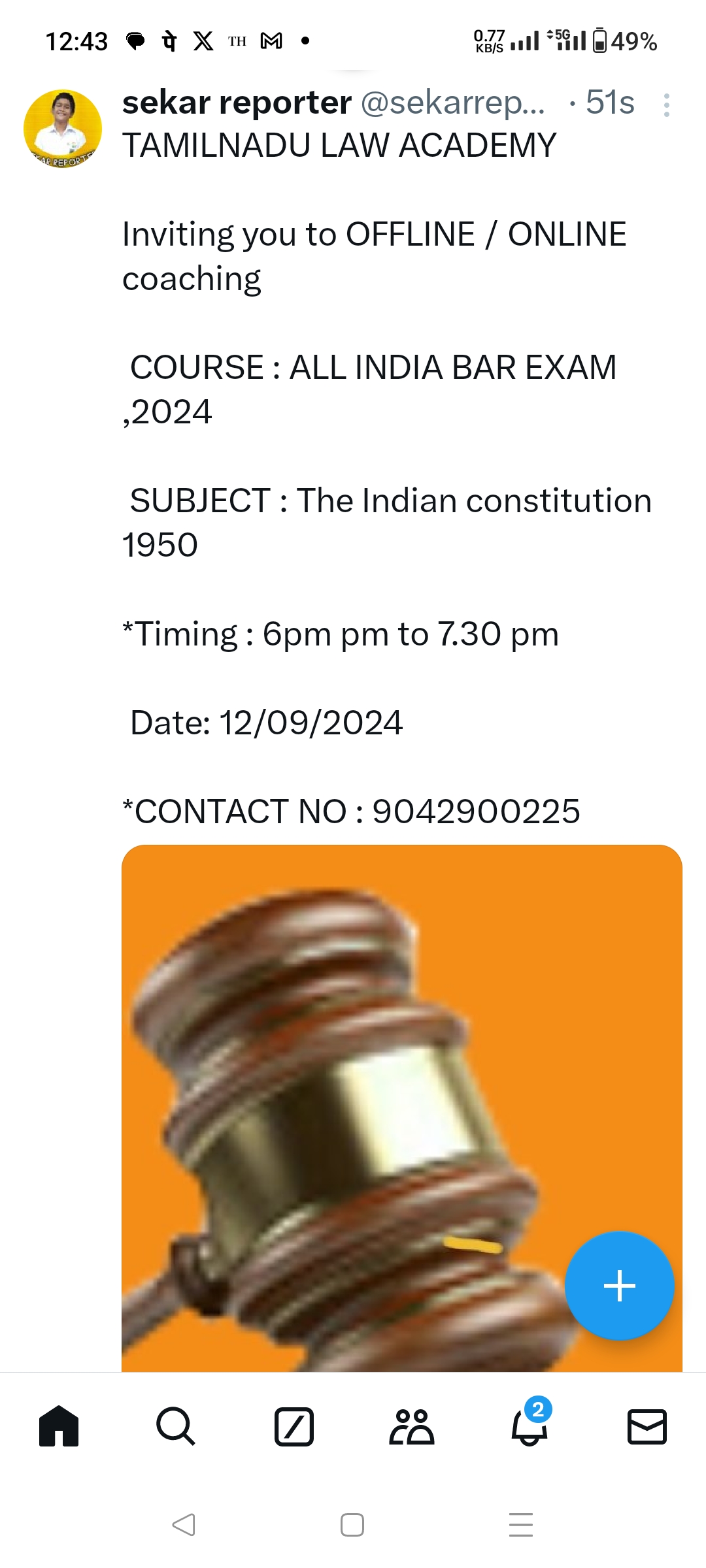Justice S.M. Subramaniam and Justice N. Senthilkumar, delivered a significant judgment in the case of Usha v. The Director General of Police and Another (W.P. No. 20596 of 2024), addressing the premature filing of writ petitions before the expiry of the statutory period allowed to competent authorities for decision-making.
[08/09, 08:07] sekarreporter1: Writ Petitions Prematurely Filed Before Statutory Time Not Entertained Unless Extraordinary Circumstances Exist: Madras High Court
https://lawtrend.in/writ-petitions-prematurely-filed-before-statutory-time-not-entertained-unless-extraordinary-circumstances-exist-madras-high-court/
[08/09, 08:07] sekarreporter1: “
VIP MEMBER LOGIN
HomeJudgements
JUDGEMENTS
Writ Petitions Prematurely Filed Before Statutory Time Not Entertained Unless Extraordinary Circumstances Exist: Madras High Court
By
Law Trend
September 7, 2024 11:24 AM
The Madras High Court, comprising Justice S.M. Subramaniam and Justice N. Senthilkumar, delivered a significant judgment in the case of Usha v. The Director General of Police and Another (W.P. No. 20596 of 2024), addressing the premature filing of writ petitions before the expiry of the statutory period allowed to competent authorities for decision-making.
Background of the Case:
The petitioner, Usha, the wife of a convict, Mr. Karthi S/o Ramalingam @ Eli Ramalingam (aged 42 years), currently serving a sentence at Vellore Central Prison, filed a writ petition under Article 226 of the Constitution of India. The petition sought a writ of Mandamus to direct the respondents – the Director General of Police (I.G. of Prisons) and the Superintendent of Prisons, Vellore – to grant 28 days of ordinary leave without an escort to her husband.
The petitioner’s counsel, Ms. S. Nadhiya, argued that an application for ordinary leave was submitted to the respondents on 27th June 2024. However, since there was no response, the writ petition was instituted on 15th July 2024. The petitioner contended that the delay in processing the application violated the rights of the prisoner.
READ ALSO How is it a Crime if Children attend the PM’s rally in School Dress? High Court questions the Police.
Legal Issues Involved:
The primary legal issue revolved around the timing of filing the writ petition. The court examined whether a writ petition could be filed before the expiry of the statutory period provided to authorities under the Tamil Nadu Suspension of Sentence Rules, 1982, for deciding on leave petitions. The relevant rules stipulate that the entire process of disposing of a leave petition should not exceed 28 days from the date of its receipt.
Rule 23 and the amended Rule 24 of the Tamil Nadu Suspension of Sentence Rules, 1982, outline the procedures for submitting and processing petitions for ordinary leave. Rule 24(5) mandates that the process must be completed within 28 days.
Court’s Observations and Decision:
The Honourable Court observed that “the practice of filing writ petitions even before the expiry of the statutory period provided to the Authorities need not be entertained by the High Court.” The judges emphasized that competent authorities must be allowed to exercise their powers per the rules. The Court held that writ petitions filed prematurely, before the expiry of the statutory period, are generally not maintainable unless extraordinary circumstances are established.
However, recognizing that the statutory period had expired during the pendency of the writ petition, the Court took an exception in this case to prevent further delays. The Court granted 21 days of ordinary leave without escort to the convict, commencing on 6th September 2024, with specific conditions regarding reporting to the local police.
READ ALSO Hymen Tear Not Necessary in All Cases of Penetrative Sexual Assault: Gauhati High Court in POCSO Case
The Court further directed the Director General of Prisons to issue consolidated instructions to all subordinate prison authorities to ensure that leave applications are processed strictly within the 28-day period as contemplated under Rule 24(5) of the Tamil Nadu Suspension of Sentence Rules, 1982. It warned that failure to adhere to these timelines would be construed as an official lapse, potentially warranting disciplinary action against responsible officials.
Quotes from the Judgment:
- “In all cases wherever an application seeking leave is filed either by the prisoners or by the relative, the petition is to be processed within the time limit as contemplated under the Rules and an order must be passed on merits and in accordance with law. Reasons must be assigned for the purpose of rejecting the petition.”
- “The writ petitions filed prematurely before expiry


![25, 06:56] Srimathi Advt Mhc: நன்றி திரு சேகர் அவர்களே. ஜஸ்டிஸ் மகாதேவன் அவர்களின் உரை அருமை . அவ](https://sekarreporter.com/wp-content/themes/hueman/assets/front/img/thumb-medium-empty.png)